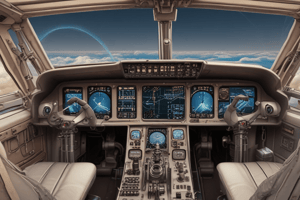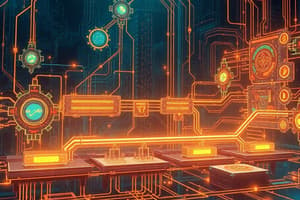Podcast
Questions and Answers
What characteristic distinguishes closed-loop control systems from open-loop control systems?
What characteristic distinguishes closed-loop control systems from open-loop control systems?
- Closed-loop systems have slower response times than open-loop systems.
- Closed-loop systems do not require a controller.
- Closed-loop systems operate without sensors.
- Closed-loop systems utilize feedback to compare output with input. (correct)
Which of the following control algorithms is specifically designed to adjust parameters based on the observed behavior of the system?
Which of the following control algorithms is specifically designed to adjust parameters based on the observed behavior of the system?
- Adaptive Control (correct)
- Fuzzy Logic Control
- PID Control
- Open-Loop Control
Which of the following describes the steady-state response of a control system?
Which of the following describes the steady-state response of a control system?
- The system's performance during continuous external disturbances.
- The behavior of the system after transients have died out. (correct)
- The system's behavior before transients have died out.
- The ability of a system to return to equilibrium after a disturbance.
In what context would fuzzy logic control be most effectively utilized?
In what context would fuzzy logic control be most effectively utilized?
What is the primary role of actuators in a control system?
What is the primary role of actuators in a control system?
Flashcards are hidden until you start studying
Study Notes
Control System
-
Definition: A control system is a set of devices or algorithms that manage, command, direct, or regulate the behavior of other devices or systems.
-
Components:
- Controller: Processes input and generates control signals.
- Plant: The system to be controlled.
- Feedback Loop: A mechanism to compare output with desired input.
- Sensors: Measure the output and provide feedback.
- Actuators: Execute control commands to influence the plant.
-
Types of Control Systems:
-
Open-Loop Control Systems:
- No feedback mechanism.
- Output is not compared to input.
- Example: Washing machine cycles.
-
Closed-Loop Control Systems:
- Feedback is used to compare output with the desired input.
- Self-correcting based on feedback.
- Example: Thermostat-controlled heating.
-
-
Key Concepts:
- Stability: The ability of a system to return to equilibrium after a disturbance.
- Transient Response: How a system reacts to changes before settling at steady-state.
- Steady-State Response: The behavior of the system after transients have died out.
- Control Algorithms:
- PID Control: Proportional, Integral, and Derivative control.
- Fuzzy Logic Control: Handles imprecise inputs and reasoning.
- Adaptive Control: Adjusts parameters based on system behavior.
-
Applications:
- Industrial automation (robotics, manufacturing).
- Aerospace (flight control systems).
- Automotive (cruise control).
- Home automation (smart thermostats).
-
Performance Criteria:
- Accuracy: The degree to which the output meets the desired input.
- Response Time: Speed of the system’s response to changes.
- Robustness: Ability to maintain performance despite variations in system parameters or external disturbances.
Control System Overview
- A control system manages, commands, directs, or regulates the behavior of other devices or systems.
Components of a Control System
- Controller: Processes inputs to generate control signals for system regulation.
- Plant: The specific system or process being controlled.
- Feedback Loop: Compares system output to the desired input and adjusts accordingly.
- Sensors: Measure the output and relay performance data back to the controller.
- Actuators: Implement control commands, impacting the plant's behavior.
Types of Control Systems
- Open-Loop Control Systems:
- Operate without feedback; output isn't compared to input.
- Example: Washing machine cycles, where pre-set functions run independently of results.
- Closed-Loop Control Systems:
- Utilize feedback to adjust performance; output is consistently compared to input.
- Example: A thermostat that regulates heating based on temperature feedback.
Key Concepts in Control Systems
- Stability: Ability of a system to revert to equilibrium after disturbances.
- Transient Response: System behavior during changes before stabilizing.
- Steady-State Response: Consistent behavior observed once transients subside.
Control Algorithms
- PID Control: Combines Proportional, Integral, and Derivative actions for robust control.
- Fuzzy Logic Control: Addresses imprecise inputs, allowing for reasoning based on qualitative data.
- Adaptive Control: Modifies control parameters based on real-time system behavior.
Applications of Control Systems
- Widely used in industrial automation, including robotics and manufacturing processes.
- Critical in aerospace for flight control systems to ensure safety and precision.
- Implemented in automotive technology, such as cruise control for maintaining speed.
- Extends to home automation with devices like smart thermostats for energy efficiency.
Performance Criteria for Control Systems
- Accuracy: Measurement reflecting how closely output matches desired input.
- Response Time: Speed at which the system reacts to changes in the input.
- Robustness: System’s capacity to maintain performance despite variations and disturbances.
Studying That Suits You
Use AI to generate personalized quizzes and flashcards to suit your learning preferences.




